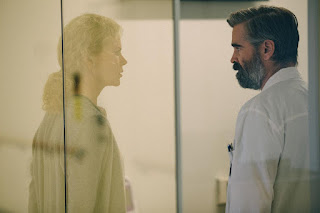The Killing of a Sacred Deer - A repulsive concept that leads to a lesson about God's love - 3 stars
The human experience tends to come back to the notion of justice. It is as simple as simple everyday conversations in the form of throwaway lines like, ‘That isn’t fair’ or ‘How can people get away with that?’ We can speculate on how to address these universally challenging subjects, but most of the time the answers are less than satisfying. What if a family member dies on the operating table and it comes to light it was due to the negligence of a doctor? After being investigated, the doctor is not held to account for his actions, what would you do? These questions boil under the surface of this disturbing character analysis from writer/director Yorgos Lanthimos (The Lobster).
Even though Dr Steven Murphy (Colin Farrell) leads a hectic life as a cardiovascular surgeon, he takes time out of his schedule to support Martin (Barry Keoghan), a teen who lost his father in a tragic accident. Unbeknownst to his wife (Nicole Kidman) and children, he meets with the young man over a meal just to chat. Eventually, Steven introduces Martin to his family and after winning them over things begin to go wrong within the Murphy household. Both of the Murphy children fall ill to an unknown ailment, and while they are in the hospital, Martin shares that he is behind their sickness and that it is payback for the respected doctor's past and this is the price for his transgressions.
The difference between a traditional horror/revenge film and a Lanthimos' project is the alarming elements that extend beyond the mere threat to human life. There is no knife-wielding psycho or a villain with a handlebar moustache to despise, but the horrific reality that the enemy is within man’s own heart. This film will get under the skin of all who manage to stomach the philosophical and moral quagmire that it represents, but it does forcefully open the door on the state of the human soul.
Colin Farrell and Nicole Kidman are astonishingly emotionless, but their roles are compelling as people who seem to have lost the zest for life. Something that all marriages and families experience in various degrees. These plasticine characters show that despite all they have in the world, everything in their world is lifeless. Then when confronted with the horrific choices of the storyline, they move from a comatose existence to being forced into truly living. Being faced with their past sins and the need for restitution becomes a soul-searching metaphorical heart surgery. The exposure within the distressing inventiveness of the script and the performances are the desperate state of mankind’s situation on this earth. This is supported by the intentionally understated, but cleverly ominous performance of Barry Keoghan. He holds his own against the seasoned veteran actors and is one of the best villians i cinema this year. The reason it is exceptionally repulsive isn’t due to graphic violence or disturbing visuals, but how close it cuts to the harsh realities of life.
From the opening sequence of an actual open heart surgery, the metaphorical foreshadowing is not lost in how the Greek director is going to expose humanity’s inner workings. There is brilliance in this concept and methodical application of each aspect of the film, but The Killing of a Sacred Deer is impossible to enjoy.
REEL DIALOGUE: What are some of the bigger questions to consider from this film?
Spoiler alert: Reel Dialogue contains a key element to the story
With Dr. Steven Murphy confronting the fact that he must choose to kill one of his children to pay restitution for a mistake, he made on the operating table. The situation is offensive, stomach-churning and repulsive. The Killing of the Sacred Deer is a horror film that strikes at the very heart of every parent and is impossible to forget.
Interestingly, God came to mind throughout the agony and pain that went through the on-screen father's experience. Having to choose a child to pay the penalty for sin. It is not a direct correlation of God's experience when deciding to send his Son to pay the price for the sins of the world, but the depiction of anguish and torment was overwhelming.
Despite the horrific concept, it did open a window to the sacrifice that the Father in heaven made to send his Son to die to save humanity. Hard to imagine that this film could open considerations of the Gospel, but it was the only thing that made it possible to stomach the whole journey.
“But God demonstrates his own love for us in this: While we were still sinners, Christ died for us” (Romans 5:8)
Trailer for the film




Comments
Post a Comment